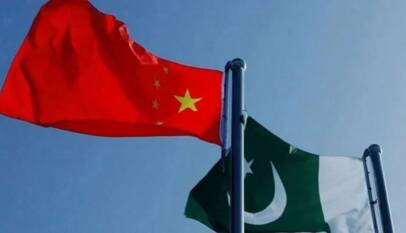Pakistan-China cooperation in cotton research to have a bright future: Pakistani Academic
Mian Faisal Nazir, a postdoctoral research fellow at the Institute of Cotton Research (ICR) of the Chinese Academy of Agricultural Sciences (CAAS) dimension of China’s research on cotton is wider in scope than Pakistan. In China, besides field-based work, lots of advanced molecular research is also going on. While the scenario is totally different in Pakistan. He said that Pakistan and China can work together to cope with climate change and associated risks in cotton.
The flow of knowledge is an important part of scientific research and will be really to see Pakistan and China to cope with the climate change and associated risks in cotton.
This was stated by Mian Faisal Nazir, who currently works as a postdoctoral research fellow at Institute of Cotton Research (ICR) of Chinese Academy of Agricultural Sciences (CAAS).
During the course of his PhD, he studied the genomic aspects of genetic differentiation and adaptive evolution of upland cotton in Anyang, China, according China Economic Net (CEN) on Friday.
Now his work is basically about investigating the primitive nature of a landrace “G. purpurascens” identified by Prof. Du Xiongming, director of Cotton Germplasm Resources Division, ICR, CAAS and his colleagues and its differential behavior with other landraces and modern cultivars.
“The dimension of Pakistan and China’s research on cotton is different, or you can say that it has a wider scope in China, while in Pakistan it is limited. Most of the cotton research work in Pakistan is focused on field-based evaluation and developing new cultivars.
However, in China, besides field-based work, lots of advanced molecular research is also going on. In Pakistan we are also doing molecular research, but due to the limited resources, its scope isn’t much wider,” he explained.
He sees clearly what difficulties are faced by Pakistan’s and China’s cotton planting.
“Recently a study described how climate change is influencing cotton production in Xinjinag, China. Similarly in Pakistan climate change associated with unpredicted rainfalls and increasing temperature are major concerns for scientists. In coming years its impact would be huge if we don’t take timely measures.”
Therefore, “there is a lot of potential in Pak-China cooperation on cotton research,” he mentioned. “The flow of knowledge is an important part of scientific research.
China has moderate weather conditions during cotton cropping season, while Pakistan has higher temperature during the season. So, it will be really interesting to see efforts from both sides to cope with the climate change and associated risks in cotton.”
CPEC’s Success Story: $25 Billion Invested Across 38 Completed Projects
ISLAMABAD: A total of 38 projects worth over $25 billion have been completed and 23 develo…












